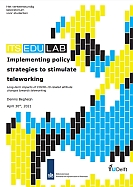Travel volumes on the Dutch main road network have been steadily increasing since 2013. The increase of traffic volumes resulted in more congestion and therefore more travel delays (travel time lost) and increased travel times. This increase was interrupted when in the beginning of 2020 the COVID-19 pandemic spread over the world. This led to a rapid increase in the use of teleworking, which resulted in large shifts in travel behaviour of Dutch travellers. Because of the decreasing impact of teleworking on congestion and consequently societal costs of delays, it would be a positive development if teleworking is continued. However, it is unclear whether this changed travel behaviour, resulting from the increase of teleworking, will continue when the COVID-19 outbreak has been resolved, or whether people will fall back in their previous behavioural patterns. Although research did show that triggers, such as pandemics, can affect attititudes which can influence travel behaviour, the current research is not sufficient to explain the impacts of the pandemic on long-term travel behaviour. It is unclear how the pandemic compares to other abrupt changes in terms of the ability to substantially change travel behaviour, whether this can be influenced by policies, and which policy measures can be applied. Current theoretical models do not fully explain the enduring impact of abrupt changes on travel behaviour and are not validated by qualitative data.
This report contains new research which combines existing insights on the effect of abrupt changes on travel behaviour change, to determine attitude changes of employees due to the COVID-19 pandemic, to identify enduring impacts of the COVID-19 pandemic on teleworking and to propose policy measures which sustains teleworking in the future. In general, the appreciation towards teleworking among employees towards teleworking during the pandemic has increased. And this gives possibilities to develop and implement policies to persist he desired travel behaviour.
